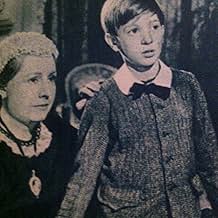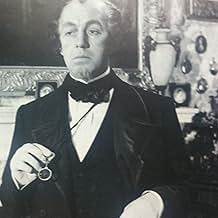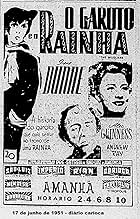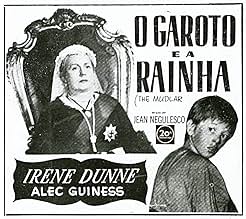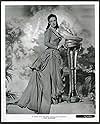ÉVALUATION IMDb
6,9/10
1 k
MA NOTE
Ajouter une intrigue dans votre langueAn urchin, scavenging on a bank of the River Thames, finds a cameo depicting Queen Victoria. So taken by her beauty, he is determined to see her and sets off for Windsor Castle.An urchin, scavenging on a bank of the River Thames, finds a cameo depicting Queen Victoria. So taken by her beauty, he is determined to see her and sets off for Windsor Castle.An urchin, scavenging on a bank of the River Thames, finds a cameo depicting Queen Victoria. So taken by her beauty, he is determined to see her and sets off for Windsor Castle.
- Nommé pour 1 oscar
- 2 victoires et 1 nomination au total
Nicholas Amer
- Servant
- (uncredited)
Pamela Arliss
- Princess Christian
- (uncredited)
Wallace Bosco
- MP
- (uncredited)
Michael Brooke
- Prince Albert
- (uncredited)
Ernest Clark
- Hammond
- (uncredited)
Joe Cunningham
- Member of Parliament
- (uncredited)
Patricia Davidson
- A Maid in Windsor Castle
- (uncredited)
Grace Denbeigh-Russell
- Queen's Maid
- (uncredited)
George Dillon
- Jailer
- (uncredited)
Avis en vedette
A typically good and effective heartstrings film of the era, with the underdog predictably triumphing, but the very best part was the brilliant Alec Guiness. What a talent! His firm, honest but loyal role as PM Disraeli was surely one of the most intelligent I have seen in film. His entire role dialog was nothing short of premier, with equal talent in his delivery of it that are both so very lacking in today's films, for the most part.
His so very erudite and eloquent speech to the House of Commons about the rights of Britain's children that included Mudlarks(really about all underdogs everywhere), and the obligation for England(and all of us everywhere)to care for and about them was astonishing and encouraging, especially where underdogs and common folk are often seen as nuisances and impediments to rich men seeking political power primarily to help themselves and their rich cronies. In reality, nothing ever changes or improves in the wealthy's perception of those without wealth, but a good fantasy about caring never hurts and may someday help as it showcases human awareness of this best-of-all-worlds ideal if not the real accomplishment of it. Maybe one day? That is the message and benefit and hope of this kind of story.
A grand film in the old style, with outstanding writing and acting.
His so very erudite and eloquent speech to the House of Commons about the rights of Britain's children that included Mudlarks(really about all underdogs everywhere), and the obligation for England(and all of us everywhere)to care for and about them was astonishing and encouraging, especially where underdogs and common folk are often seen as nuisances and impediments to rich men seeking political power primarily to help themselves and their rich cronies. In reality, nothing ever changes or improves in the wealthy's perception of those without wealth, but a good fantasy about caring never hurts and may someday help as it showcases human awareness of this best-of-all-worlds ideal if not the real accomplishment of it. Maybe one day? That is the message and benefit and hope of this kind of story.
A grand film in the old style, with outstanding writing and acting.
A fine film that is mainly forgotten but still worth seeing, it deals with a homeless boy in Victorian London (1876) who rubs shoulders with two of the leading figures of the time - Queen Victoria and Benjamin Disraeli.
A heart-warming story of historical fiction, directed by Jean Negulesco, it displays the formidable acting talent of Irene Dunne and Alex Guinness. Disreali's audience with the Queen at the start draws us into the main themes of the movie. Andrew Ray, as the boy, is exceptional. The great character actor Finlay Currie plays the role of the Queen's friend John Brown, a crusty, boozy Scot and a close companion of the Queen, who takes a personal interest in the boy. (The character of John Brown was also the subject of the movie from the 1990's - Mrs. Brown, played by Dame Judi Dench.)
The role of the mudlark-a child who scavenges on the banks of the Thames is played by Andrew Ray. It was while doing this,that he found a cameo of the Queen. Illiterate and poverty-stricken, he knows nothing about the Queen but when he finds out who she is, he wants to meet her. The discovery of the child during a banquet at Windsor Castle becomes a national story, in which the Prime Minister (Alex Guinness as Disraeli) uses the issue to underscore the need for social reform and to thus win support for his government's program. The speech in the House of Commons is a high point in the movie, as is the widowed Queen's encounter with the boy near the end of the film.
Colourful conversations between Alex Guinness (Disraeli) and Findlay Currie (John Brown) add sparkle to the film as does a well-lubricated Brown as he takes the boy on a tour of the castle.
At the end, Disraeli and Brown, totally different in character, are drawn together by their love of the monarch. The widowed monarch, at first alarmed by the boy's stealing into her private residence, is moved by a second encounter when she learns that he merely wanted to see her. This also suited the Prime Minister's purpose of giving the monarch confidence to come out of seclusion.
A heart-warming story of historical fiction, directed by Jean Negulesco, it displays the formidable acting talent of Irene Dunne and Alex Guinness. Disreali's audience with the Queen at the start draws us into the main themes of the movie. Andrew Ray, as the boy, is exceptional. The great character actor Finlay Currie plays the role of the Queen's friend John Brown, a crusty, boozy Scot and a close companion of the Queen, who takes a personal interest in the boy. (The character of John Brown was also the subject of the movie from the 1990's - Mrs. Brown, played by Dame Judi Dench.)
The role of the mudlark-a child who scavenges on the banks of the Thames is played by Andrew Ray. It was while doing this,that he found a cameo of the Queen. Illiterate and poverty-stricken, he knows nothing about the Queen but when he finds out who she is, he wants to meet her. The discovery of the child during a banquet at Windsor Castle becomes a national story, in which the Prime Minister (Alex Guinness as Disraeli) uses the issue to underscore the need for social reform and to thus win support for his government's program. The speech in the House of Commons is a high point in the movie, as is the widowed Queen's encounter with the boy near the end of the film.
Colourful conversations between Alex Guinness (Disraeli) and Findlay Currie (John Brown) add sparkle to the film as does a well-lubricated Brown as he takes the boy on a tour of the castle.
At the end, Disraeli and Brown, totally different in character, are drawn together by their love of the monarch. The widowed monarch, at first alarmed by the boy's stealing into her private residence, is moved by a second encounter when she learns that he merely wanted to see her. This also suited the Prime Minister's purpose of giving the monarch confidence to come out of seclusion.
This is a slightly stiff rendition of an old story about a young scavenger who makes his living from the debris found by the river Thames in London. One day he happens upon a portrait of Queen Victoria and sets off to Windsor Castle (no small distance) to try and meet his Sovereign. Meantime the Queen (Irene Dunne) is still wallowing in grief following the death of Prince Albert and her Prime Minister Benjamin Disraeli (Alec Guinness) is trying to coax her from her melancholy before it is too late for both her and the monarchy. A combination of circumstances lead to an engaging and slightly humorous set of scenarios and the mudlark gets his wish. This film provides an interesting observation on just how detached the Queen was from all of her people, not just the poorest; and of how ultimately the demonstration of innocence and, to some extent, loyalty by the child - along with some sagely interventions from Finlay Currie's highland ghillie John Brown - served to bring the Queen out of her isolation. It also features quite a stirring - and potent - oration from Guinness analysing the poverty and injustice visited upon those whom the state regarded as dispensable. A touching and life-affirming little film well worth a watch.
This is one of those delightful post-war British films that once seen is hard to forget. The story centers around Wheeler, a London "mudlark" (an orphan who scavenges the Thames at low tide), who, upon finding a cameo of Queen Victoria, sets off to Windsor to see "the mother of England." Victoria is secluded as the "widow of Windsor" and a desperate Disraeli is vainly attempting to urge her to resume public duties. However, when Wheeler finally gets to meet his Queen, Victoria is moved to return to her public life. Wonderful performances by Irene Dunne as Victoria, Alec Guinness as Disraeli, Finlay Currie as John Brown and Andrew Ray as Wheeler, the mudlark. If only Fox would release this on DVD or VHS!
I found this on YouTube and I'm pleased I did. This is a black and white film from the good old days of movies, before CGI, profanity and mindless action were essential to a movie's credibility; when good acting and intelligent writing were much more important. I'm being overly cynical, I know, but you get the point.
The Mudlark is an enjoyable little film, with a cast of fine British actors of yesteryear who are a pleasure to see in action once more. The plot of this may be a bit silly in places, and sometimes it gets a bit slow (a half baked and totally unnecessary romantic sub plot doesn't help), but for the most part this is a charming movie and should be enjoyed by adults and older children alike.
The Mudlark is an enjoyable little film, with a cast of fine British actors of yesteryear who are a pleasure to see in action once more. The plot of this may be a bit silly in places, and sometimes it gets a bit slow (a half baked and totally unnecessary romantic sub plot doesn't help), but for the most part this is a charming movie and should be enjoyed by adults and older children alike.
Le saviez-vous
- AnecdotesAlec Guinness' speech to Parliament, in the role of Benjamin Disraeli, is delivered in an unbroken, single take of nearly seven minutes of impassioned dialogue.
- ConnexionsVersion of Victoria the Great (1937)
- Bandes originalesSilent Night, Holy Night
(1818) (uncredited)
Music by Franz Xaver Gruber
Lyrics by Joseph Mohr
Sung by Carolers during the Christmas season
Meilleurs choix
Connectez-vous pour évaluer et surveiller les recommandations personnalisées
- How long is The Mudlark?Propulsé par Alexa
Détails
- Durée
- 1h 39m(99 min)
- Couleur
- Rapport de forme
- 1.37 : 1
Contribuer à cette page
Suggérer une modification ou ajouter du contenu manquant

